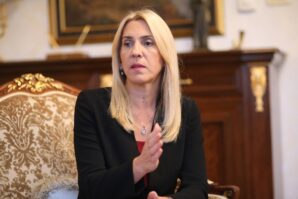
EU Commissioner for Neighborhood and Enlargement Oliver Varhelyi has arrived in Bosnia and
After Serbia, he does not come to our country empty-handed, the arrival of 10 thousand and 530 doses of Pfizer vaccines is expected soon.
During the visit, Varhelyi will discuss with officials the response to the coronavirus pandemic and the European Union’s support in that context.
Earlier, The European Commission and Austria announced the conclusion of agreements for the delivery of COVID-19 vaccines for the Western Balkans. The 651,000 BioNTech/Pfizer doses are funded by the European Commission and will be shared with the facilitation of Austria. The first delivery to all the partners in the region is due in May, with regular tranches to continue until August. The largest number will arrive in BiH, 214,000 doses.
The President of the European Commission, Ursula von der Leyen, said: “It is crucial to speed up the vaccination campaigns everywhere. I am happy to announce that we have secured doses to help vaccinate health care workers and other vulnerable groups in the Western Balkans. The European Union stands by our partners in the region, who have been looking to us for support. I want to thank Austria for facilitating this transfer, showing its firm commitment and solidarity with the Western Balkans”.
Enlargement and Neighbourhood Commissioner, Olivér Várhelyi, added: “Despite the current global shortage, the EU will deliver life-saving vaccines for the Western Balkans. We have provided support from the start of the COVID19 pandemic: First, with emergency medical equipment like masks, ventilators, intensive care units and ambulance vehicles; second, by strengthening the resilience. Now, we will help ensure the vaccination of all frontline medical workers across the region, as well as some of the other vulnerable groups. We care about the Western Balkans whose future is in the European Union”.
Austrian Foreign Minister, Alexander Schallenberg, stressed: “It is a top priority to make COVID-19 vaccines rapidly and comprehensively available to people across Europe. Against this backdrop, supporting the Western Balkans to obtain vaccines is an act of European solidarity and an investment in the health and security of the whole region. After all, blank spots on the vaccination map, wherever they may be, pose a danger to all of us. No one is safe until everyone is safe”.
Austria has facilitated the sharing of these vaccines through legal arrangements with the producer and the Western Balkan partners. The doses are funded from the EUR 70 million package adopted by the Commission in December 2020 to help cover the cost of vaccines, secured under the EU’s advance purchase agreements for the Western Balkan partners.
The overall distribution between countries will be based on the epidemiological needs, prioritising in first instance medical workers and other vulnerable groups.

















